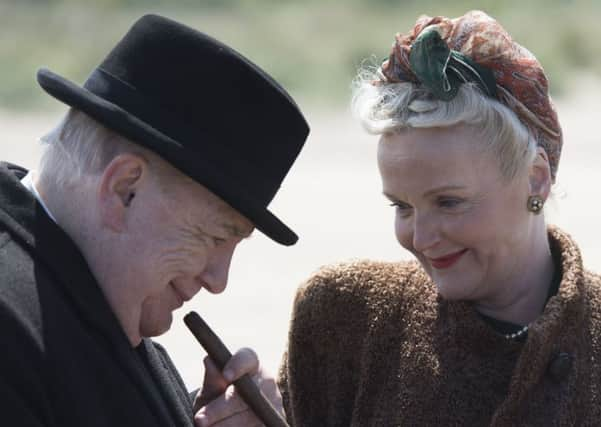A great Briton


The release of Jonathan Teplitzky’s Churchill is certainly timely.
In the wake of the battle for Number 10, the biopic – a ticking-clock thriller that follows Britain’s prime minister Winston Churchill in the 96 hours before the D-Day landings in June 1944 – has raised some poignant questions.
Advertisement
Hide AdAdvertisement
Hide AdNamely, to what extent our modern day politicians measure up? Or differ, as the case is argued.
“Nobody matches him,” quips Brian Cox, who, in the titular role, puts in a forceful performance of the late wartime hero.
“There’s an element that’s strongly missing, which is really good political leadership and leadership with vision. It’s all self-aggrandising now,” he adds, shaking his head. “It’s not about the future, it’s not about the country, and it’s not about how you bring this community together.”
“We live in a multicultural country that has to be brought together and for too long it’s been allowed to drift apart,” alleges the 71-year-old, who famously defined Shakespeare’s King Lear at the National Theatre.
Advertisement
Hide AdAdvertisement
Hide Ad“There has to be a fusion and you need a great leader to bring that fusion about. We ain’t got one – and we need one desperately.”
Teplitzky shares a similar view.
“I think Churchill would have won the [recent] election if he was standing, because what he did and what his great talent was, was to lead people in whatever way he felt best equipped to do,” he says.
“To give them the sense in very black and white extraordinary times – we live in much more murky times [today] – that tomorrow would be better and some time at the end of that process for our way of life, what we believe in, what we feel about each other, there was hope. I don’t necessarily think that every politician knocking about today even can identify with that,” muses the Australian director, whose credits include The Railway Man and Marcella.
“That’s why it’s poignant to watch a film like this now, to ask those questions.”
Advertisement
Hide AdAdvertisement
Hide AdTo open up the debate, Teplitzky set his sights on uncovering the man behind the myth.
“The different perspective on Churchill, not just his performance as the prime minister, but his vulnerabilities, are as important for us to know,” he explains. “As they make his achievements all the more great.
“This was a man whose best years, in many ways politically, were already behind him. This is four years after the Blitz, this is at a very vulnerable time in his life; he’s suffering from depression, drinking a huge amount, and in many ways he’s isolated from some of the big decision-making he would have been in the centre of a few years earlier.
“[This is] very different from the other portraits that are painted of him.”
Yet it is all in the “great humanity”, remarks Cox.
Advertisement
Hide AdAdvertisement
Hide Ad“I mean, we’re human beings after all, everything costs, you pay your price, and I don’t think that he was exempt.
“He was an amazing individual and he had an extraordinary constitution,” adds the Scottish star, reeling off anecdotes from a time when Churchill put a “curse” on Dundee.
“He drank too much, he had depression, he only slept three hours a night, but he also had this great wife,” he says, gesticulating in the direction of his co-star Miranda Richardson.
“She wouldn’t take any rubbish from this great big baby,” quips the Harry Potter actress, 59, who plays the unflinching Clementine “Clemmie” Churchill.
Advertisement
Hide AdAdvertisement
Hide Ad“She knows what he needs to hear – that’s part of the contract, that’s part of the deal. They know each other very well, and for him to have the strength to get through the next bit, it’s kind of a buck-up-shape-up attitude.”
“But underneath that there’s a real knowledge and a real love and a real warmth,” adds Richardson, “because otherwise he would have broken down completely.
“She knew what he had to do to be able to get the country through the war, she knew what the country needed to hear, and she knew which construct of Churchill they needed to see.”
It is a double act that is even more credible on screen, thanks to Cox’s impressive transformation.
Advertisement
Hide AdAdvertisement
Hide Ad“He became Churchill,” Teplitzky enthuses of the actor, who shaved his head, gained weight and perfected the leader’s jutting lower lip and walk for the part. “A great privilege of what I do is to be as close as I will ever come to having a conversation with Churchill.
“It brings history alive,” he adds. “His performance is amazing in capturing and enabling an audience to sit almost on the shoulder of Churchill as he emotionally and psychologically and politically manoeuvres through this 96 hours before D-Day.”
In fact so convincing was Cox’s depiction that it left Ella Purnell, who plays Churhill’s young secretary Helen Garrett, visibly shaking on set.
“I was so intimidated to meet him and to work on a film with all these amazing, experienced actors,” she says. “It’s really scary.
Advertisement
Hide AdAdvertisement
Hide Ad“There’s one scene where he has to grab something out of my hand and every time he did it I would literally jump out of my skin, because he’s got this incredible resonant voice that fills every corner of the room.
“Obviously you’re always trying to find the truth of the moment anyway as an actor, but I really did feel it,” says the Londoner, smiling. “And at the end he would come and pat me on the shoulder and be like, ‘there, there’.”
Churchill (PG) opens in cinemas today.